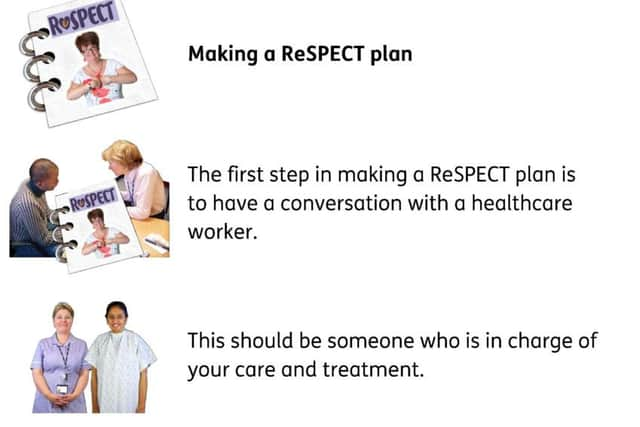ReSPECT to be rolled out across the Borders by end of 2019


Would your family know your wishes if you were unable to relate them to the hospital staff?
Would you want the team to take extraordinary measures to save you? What medication would you like to receive? Would you want to donate your organs?
Advertisement
Hide AdAdvertisement
Hide AdNone of us really wants to think about our own mortality but these are questions we should all be considering, just in case the worst does happen.


Borders General Hospital has recently piloted a new initiative that helps patients to make informed decisions about their future care.
Given the trial’s success, the Recommended Summary Plan for Emergency Care and Treatment – ReSPECT for short – will be rolled out later this year, once online forms are made available.
It has been created by The Resuscitation Council following discussions with professional bodies, doctors, nurses and patients.
Advertisement
Hide AdAdvertisement
Hide AdIt aims to ensure that, in an emergency, the patient’s wishes are known – and clearly documented on a ReSPECT form.
It is expected that the online form will be available for local patients to use by the end of the year.
But Dr Annabel Howell, associate medical director at NHS Borders, is hoping readers will start thinking about their own ReSPECT plan now.
She said: “Patients often have advance directives if they have a terminal or long-term health condition.
Advertisement
Hide AdAdvertisement
Hide Ad“Previously, though, there was nothing to cover emergency care – when a patient arrives in the A&E, completely out of the blue.
“It can be a really stressful time for patients and their families, especially if they have not discussed what treatment they want or how aggressive they want it to be.
“For example, I’m fit and healthy as far as I know but were I to have a severe stroke I would not want to be resuscitated.
“That’s my own personal opinion but it’s one my family knows about.
Advertisement
Hide AdAdvertisement
Hide Ad“Not everyone has those conversations with their loved ones though.
“So the ReSPECT form is a way for people to start thinking about what treatment they want.
“It’s also important to discuss those decisions with the people in your life so they are aware of your wishes.
“Having the ReSPECT form in place means the staff treating you in hospital will also be aware of your wishes.
Advertisement
Hide AdAdvertisement
Hide Ad“Everyone is an individual – this is a way for patients to have a say in their own treatment, should an emergency situation arise.”
A ReSPECT plan must be created between a patient and one or more of the health professionals who are involved in their care.
It will then stay with the patient but will also be available to health and care professionals faced with making immediate decisions in an emergency in which the person has lost capacity to participate in the decision-making process.
The process is intended to respect both patient preferences and clinical judgement – which is why a health professional is involved in the process.
Advertisement
Hide AdAdvertisement
Hide AdAnnabel explained: “It allows for patients to be quite specific about their wishes but they need to be realistic too and the doctor or nurse can help them with that.
“For many, it’s also an opportunity to find out more about their condition and gain a greater understanding of how to manage symptoms.
“Together, the clinician and patient will create a ReSPECT plan that can be followed in the event of an emergency.”
Borders General Hospital ran a pilot in a bid to iron out any problems raised by both patients and staff.
But the feedback was positive from all involved.
Advertisement
Hide AdAdvertisement
Hide AdSo the hospital hoped to roll out the ReSPECT forms in June but there has been a slight delay with the technology required.
Annabel explained: “We worked off paper forms during the pilot but an online tool is being created now.
“We want to wait until the online form is ready before asking patients to get involved. That way, we can avoid any duplication.”
ReSPECT will be rolled out later this year though.
Annabel added: “We tend not to have conversations about our care with our families but we all should.
Advertisement
Hide AdAdvertisement
Hide Ad“I’d encourage people to start those conversations now so when the electronic form is available, they can get on board.
“Ambulance crews, out-of-hours doctors, care home staff and hospital staff will be better able to make immediate decisions about a person’s emergency care and treatment if they have prompt access to agreed clinical recommendations on a ReSPECT form.”
For more information. visit www.respectprocess.org.uk.